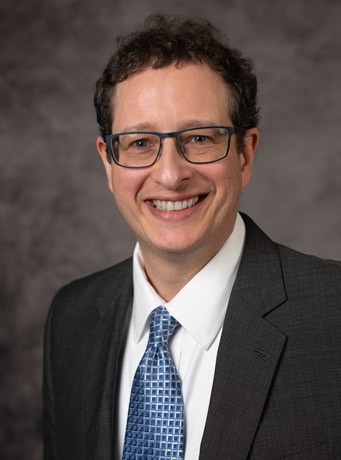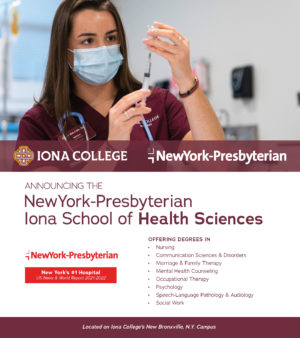Q&A with Marcus Tye, new dean of Pace’s College of Health Professions

This past July, Pace’s College of Health Professions appointed its new dean, Marcus Tye. He will succeed Harriet Feldman, who served as dean of the school for over a decade, and was dean and a professor at the Lienhard School of Nursing for over 15 years before that. Tye is a licensed clinical psychologist who previously served as dean of the School of Health Sciences and interim dean of the School of Education at the College of Staten Island, City University of New York.
The Business Journal reached out to Tye about his future plans for the school.
What brought you to Pace and how has your background prepared you for this position?
“The College of Health Professions (CHP) has a particularly broad and deep portfolio of programs in both health professions and health sciences. CHP and Pace itself have outstanding success with helping students achieve career success right out of the gate. My previous four years as a dean in CUNY at the College of Staten Island was great preparation for working with a diverse population of students, and what excites me most about Pace is that we have the resources to deliver on the quality of the student experience for a truly world-class education.”
What will be your biggest priorities as dean?
“First, let me acknowledge with gratitude the remarkable accomplishments of Dean Emerita Dr. Harriet Feldman, who in 28 years at Pace helped grow the Lienhard School of Nursing into a vibrant College of Health Professions, and who remains at Pace as our chief wellness officer.
“My first priority is to continue her legacy of success enabling our amazing students and alumni to achieve their career goals. Next, I hope to carefully expand our programs with an eye toward the needs of hospital systems in Westchester as well as the greater New York metro area in a way that continues to focus on student success.”
How will you influence plans for the new Healthcare Hub at Pace? What gaps in its offerings does the College of Health Professions hope to fill, going forward, with these new plans for greater modernization?
“We already have very modern, technology-rich simulation facilities for training students in the highest standards of clinical care their future employers will seek, and I”™m delighted that CHP has already received a Higher Education Capital Matching Grant Program (HECap) for further expansion of these important skills laboratories in our new Healthcare Hub, led by Ibi Yolas.
“In addition to New York state funding of $1 million, Pace has committed $3 million to this. We also are proud to have recently received a $2 million United States Health Resources & Services (HRSA) ”˜STEPS To Success”™ grant focused on education and retention in Nursing for underrepresented ethnic and racial minority groups, a project submitted and led by Vice Dean of CHP and the Lienhard School of Nursing Rhonda Maneval. Strained medical systems need a workforce that is increasingly representative of the diverse communities served, and I believe Pace truly fulfills this mission. The Healthcare Hub will expand our commitment to meeting the needs of our students and Westchester”™s hospitals and other medical centers.”
What aspects of the College of Health Professions do you hope to expand and build upon?
“CHP is a perfect size for interprofessional collaboration in educating our students. Smaller institutions do not offer the breadth of programs that we offer, including Physician Assistant, Occupational Therapy, Nutrition and Dietetics, Communication Sciences and Disorders, Health Sciences and every level of Nursing. The largest institutions are frequently quite ”˜siloed,”™ such that training rarely offers the chance to collaborate across professions.
“I am proud of the accomplishments of our alumni, outcomes I hope to continue as we add new programs. New York state recently approved our application for a Master of Science in Health Informatics program, which we launch next year, a program run in conjunction with the Seidenberg School of Computer Science and Information Systems (CSIS).
“I hope to build additional new programs in growing areas such as public health and genetic counseling, while integrating LGBTQ+ affirming health care and culturally sensitive care throughout our programs. Pace CHP faculty have expertise in both these important areas, as well as other innovative areas such as supportive therapy animals in health care, areas where we can benefit both our students and established professionals as they seek to further their skills.”
What effects have the Covid-19 pandemic had on health education and students studying health professions and what effects do you believe will last? How has the College of Health Professions responded to these changes?
“This is a great question. Pace led the country among private nonprofit colleges and universities in a plan for a safe return to on-campus instruction in fall 2020, well ahead of many other institutions. We all learned that flexibility in using online and hybrid technology and virtual simulations can result in higher-quality outcomes for students, but only if done right and with intention.
“Evidence from nursing science suggests that students who receive a blend of in-person training and physical and virtual simulations can be more confident and more competent than those who have only in-person training. In this multilayered hybrid-learning environment, students practice skills, develop critical thinking and improve performance in a safe and nurturing environment.
“Our simulation labs promote advanced communication skills between different disciplines, interprofessional collaboration, multiple patient management and the essential skills necessary to work as a team to help improve patient outcomes. The ability to review clinical care and collaborate across professions can be facilitated by such innovation, something CHP has been quick to adopt with an eye toward quality of training. I am hopeful that future New York state legislation will permit formal integration of this in nursing clinical hours.
“As professionals have become more comfortable with online education, there are opportunities for us to share our faculty expertise and innovation nationally and beyond in areas such as transgender-affirming health care, and the use of therapy animals in medical settings.
“Our students, faculty and staff have all been resilient and steadfast in their commitment to offering quality education, even during the most challenging of times.
“I have to conclude with gratitude and respect for Pace”™s almost 12,000 College of Health Professions and Lienhard School of Nursing alumni, most of whom continue on the front lines of health care. I hope they will remain connected with us and help us honor and share their experiences of courage and compassion.”
